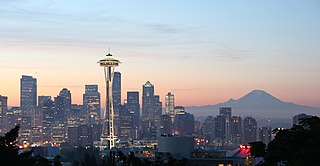
The American Revolutionary War, also known as the Revolutionary War or American War of Independence, was an armed conflict that was part of the broader American Revolution, in which American Patriot forces organized as the Continental Army and commanded by George Washington defeated the British Army.

George Washington was an American Founding Father, military officer, and politician who served as the first president of the United States from 1789 to 1797. Appointed by the Second Continental Congress as commander of the Continental Army in 1775, Washington led Patriot forces to victory in the American Revolutionary War and then served as president of the Constitutional Convention in 1787, which drafted the current Constitution of the United States. Washington has thus become commonly known as the "Father of his Country".

Oliver Laurence North is an American political commentator, television host, military historian, author, and retired United States Marine Corps lieutenant colonel.

The Cascade Range or Cascades is a major mountain range of western North America, extending from southern British Columbia through Washington and Oregon to Northern California. It includes both non-volcanic mountains, such as many of those in the North Cascades, and the notable volcanoes known as the High Cascades. The small part of the range in British Columbia is referred to as the Canadian Cascades or, locally, as the Cascade Mountains. The highest peak in the range is Mount Rainier in Washington at 14,411 feet (4,392 m).

The Pacific Northwest (PNW), sometimes referred to as Cascadia, is a geographic region in Western North America bounded by its coastal waters of the Pacific Ocean to the west and, loosely, by the Rocky Mountains to the east. Though no official boundary exists, the most common conception includes the U.S. states of Oregon, Washington, northern Idaho, and the Canadian province of British Columbia. Some broader conceptions reach north into Alaska and Yukon, south into northern California, and east into western Montana. Other conceptions may be limited to the coastal areas west of the Cascade and Coast mountains.

Washington, D.C., formally the District of Columbia and commonly known as Washington or D.C., is the capital city and federal district of the United States. The city is on the Potomac River, across from Virginia, and shares land borders with Maryland to its north and east. It was named for George Washington, the first President of the United States. The district is named for Columbia, the female personification of the nation.

The West Coast of the United States – also known as the Pacific Coast, and the Western Seaboard – is the coastline along which the Western United States meets the North Pacific Ocean. The term typically refers to the contiguous U.S. states of California, Oregon, and Washington, but it occasionally includes Alaska and Hawaii in bureaucratic usage. For example, the U.S. Census Bureau considers both states to be part of a larger U.S. geographic division.

The Xyelidae are a comparatively species-poor family of sawflies, comprising about 80 extant species in five genera worldwide, and is the only family in the superfamily Xyeloidea. The fossil record of the family is extensive, comprising more than 120 species and including the oldest fossil Hymenoptera species dating back to the Triassic, between 245 and 208 million years ago. Xyelidae are to be regarded as living fossils since they represent one of the oldest lineages of insects and include still extant forms.

Washington, officially the State of Washington, is the westernmost state in the Pacific Northwest region of the United States. It is often referred to as Washington state to distinguish it from the national capital, both named for George Washington. Washington borders the Pacific Ocean to the west, Oregon to the south, Idaho to the east, and shares an international border with the Canadian province of British Columbia to the north. The state was formed from the western part of the Washington Territory, which was ceded by the British Empire in the Oregon Treaty of 1846. It was admitted to the Union as the 42nd state in 1889. Olympia is the state capital, and the most populous city is Seattle.

Xyela is a genus of sawflies, belonging to the family Xyelidae.
Xyela alpigena is a species of sawfly in the genus Xyela and is endemic to North America. It can be found from Quebec to Maryland and Maine, and west to Utah and New Mexico. The host plant for the larvae is Pinus strobus.
Xyela bakeri is a species of sawfly in the genus Xyela and is endemic to North America. It can be found from Quebec to Florida, and west to British Columbia and California. It has widespread hosts for its larvae, including Pinus elliottii, P. palustris, P. ponderosa, P. sabiniana, and P. virginiana.
Xyela californica is a species of sawfly in the genus Xyela that is endemic to California.
Xyela concava is a species of sawfly in the genus Xyela that is endemic to North America. It can be found in Utah, Nevada, and California. The host for the larvae is Pinus monophylla and P. ponderosa.
Xyela deserti is a species of sawfly in the genus Xyela that is endemic to North America. It can be found in Nevada and California. The host for the larvae is Pinus monophylla.
Xyela dodgei is a species of sawfly in the genus Xyela that is endemic to Florida.
Xyela gallicaulis is a species of sawfly in the genus Xyela that is endemic to North America. It can be found in Virginia and Georgia. The larva feeds inside shoots and forms galls in its host which include: Pinus echinata, P. elliottii, and P. taeda.
Xyela lunata is a species of sawfly in the genus Xyela that is endemic to California. The host for the larvae is Pinus coulteri and P. sabiniana.
Xyela minor is a species of sawfly in the genus Xyela that is endemic to North America. It can be found from Quebec to Florida, and west to British Columbia and California. The larvae have widespread hosts, including: Pinus coulteri, P. elliottii, P. muricata, P. palustris, P. ponderosa, P. sabiniana, P. taeda, and P. virginiana.









